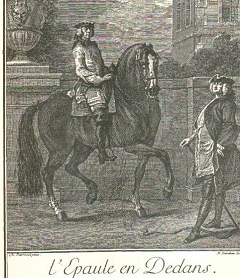Finding a voice in the work in dressage is both important and difficult. The underlying simplicity and at least an empathetic listening are needed but better still is the leap into a natural wisdom which is always present.
Most dressage, unfortunately, at least in the way it appears to be taught and practiced, is about the imposition of a standard by varying degrees of aggression. In what most people call better dressage, the aggression is usually veiled by the use of various mechanical devices such as side reins, draw reins and special bits. Oppositional aids and a sea of other aggressions are usually justified by the need to go “forward” or keeping control through a caveman like understanding of something which is passed off as leadership. Imposed authority is not the same as leadership and there is a lot of confusion around this idea.
The weight of our dressage organizations and the public media presentations form a psychological and cultural container to keep the masses in line and to make sure that what is frequently just barbarism is justified and the horse and rider are kept in an acceptable box. This makes a dressage “machine” which centers on keeping the money flowing in the sport and is about so many things other than the horse.
Genuine work may sometimes seem to be wrong because in really good dressage the horse is permitted to be less than perfect. The progression of training is not controlled by the imposition of outside authorities but by the evolution of the horse’s subjective experience.
The subjective experience of the horse is most obviously connected to that of the rider and the balance between the two is at once both mechanical and psychological. What this means is that the relationship is the guiding factor and organic. Finding your voice is always in the context of the relationship and, therefore, must include allowing the horse a voice as well.
Good dressage starts with the restoration of sanity. What this means is that as practitioners of dressage, all superfluous voices must first be silenced. This means that one must step away from the dressage culture, rule books, instructors and anything else which tells you how to be with the horse.
This is a personal quest for learning who and what you are and who and what the horse is. All equestrian knowledge must be put aside and then subjected to a very close scrutiny. It is not so much that everything is wrong as much as nothing is right until it passes the wisdom of the horse which only appears when the horse is totally free from aggressions and fear.
So we can find our voice, we must not drown out the horse’s voice in our work and we must be willing to lay down our own fears and aggressions so that we can find our own wisdom. The path forward will then show itself. Kindness to yourself and your horse is always the way forward, but it is not a dumb mechanical kindness, but an intelligent kindness which is centered in clear awareness.
The role of a good instructor who is a friend of both the horse and rider can be so helpful in sorting this out but all too frequently, instructor and trainers function more as the equitation police instead of the voice of intelligent compassion. With or without an equestrian friend, it is left to us as individual horse lovers to undertake our own education and so good dressage is finding our own voice; a voice of sanity and kindness in a culture of insanity and aggression. We have the wisdom when we find the heart and from this knowledge evolves; sacred magic is the goodness of dressage manifest.


Recent Comments